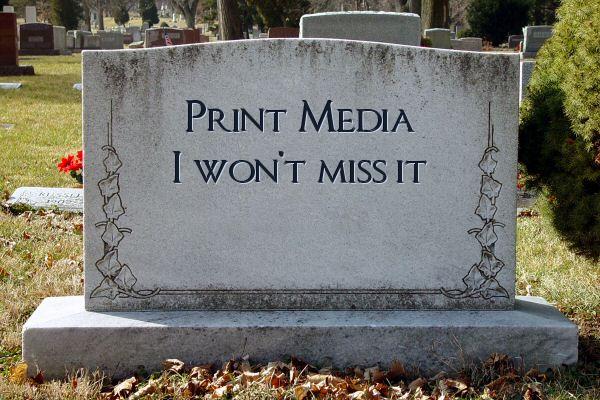On February 27, a small-to-medium business in the Denver area ceased operations. Or to hear the outcry from the employees, the very foundation of the Republic has been torn asunder.
In its day, the Rocky Mountain News was an adept vehicle to carry advertising. Circulation peaked at 400,000, and fell 38% before the paper inhaled a market-administered dose of Prussic acid. 200 editorial employees lost their jobs, many of whom quickly found work across the street at the still-functional Denver Post. The newly leisured represent .01% of the metropolitan Denver workforce.
On RockyMountainNews.com, a sidebar reads “Best of the Rocky”. Underneath it are links to the following historic stories:
Oglala Sioux bestow a tribute to the first tribal fatality in Iraq
Colorado’s deadliest traffic accident killed 20 children on Dec. 14, 1961
A five-part series that examines one tragic day on Mount Rainier
Coverage of the state’s worst wildfires
And finally,
Coverage of the April 20, 1999, shootings at Littleton’s Columbine High School
One half-expects to read “Our only regrets are that there was never a local naval base the Japanese could have attacked, and that the 9/11 terrorists didn’t fly planes into Republic Plaza and the Wells Fargo Center.”
If you graphed “modesty” on a line, with Marines and soldiers holding down one end, journalists would be so far over on the other end that the line would collapse. Every single RockyMountainNews.com column on the day the paper ceased publication was a variation on how great we are and what a valuable service we provide:
To readers, it wasn’t just a newspaper
Rocky kept swinging until the very end
When a paper dies, there are no winners
We’ll lose more than a paper
Rocky and I made it our business to be useful,
et al.
Never underestimate the power of self-importance. It’s the easiest conceit in the world, to think that the skill you’ve developed is therefore the most valuable one. Ted Williams, who hit baseballs for a living, said that hitting a baseball is “the hardest thing to do in sports”. Maybe he was right about the relative difficulty of his craft, or maybe he wasn’t. Peyton Manning would likely offer a dissenting opinion, the next time half a ton of linemen move at the speed of horses toward him as the pocket collapses and he’s left with 1.5 seconds to throw a prolate spheroid 40 yards downfield and have it gently land in the hands of a receiver who’s running a pattern that Manning himself had to memorize, all the while attempting to evade capture and almost certain excruciating pain.
This blog refuses to indulge the guilty scribes by naming them, but here are some excerpts from the above stories from the paper’s final issue:
“Newspapers don’t simply close. They die. The world goes on without them, but it’s not the same world.”
Even a child presumably understands that observing something is less worthy than actually doing it, but it takes more than juvenility to be a journalist.
Here are three more, from a different keystroker/failed novelist:
“…this curious, compelling life of the mind.”
“this experience is like having a death in the family while at the same time dying yourself. “
and
“we have so much to be proud of.”
et al.
Chemical engineers and software developers live lives of the mind. Assembling a properly punctuated 800-word screed shows that the assembler successfully completed the 4th grade.
And finally, from another of the above columns:
“Could someone tell me, please, why today feels little different from the two separate days when my parents died?”
He follows with:
“A city loses so much of its soul when a newspaper dies.”
and closes with a sentence that causes the reader to wonder when the F5 tornado ripped through the newsroom:
“I am going to go home tonight and, like so many of my co-workers, hug my loved ones.”
Had the paper’s editorial management spent more time submitting to the inevitability of technology, and less time simultaneously sticking out its chest and patting itself on the back, perhaps the Rocky Mountain News might have outlasted the Seattle Post-Intelligencer, the San Francisco Chronicle, and whichever other broadsheets are today feeling the cold tip of the scythe on their backs.
The Rocky Mountain News lost $16 million in its final year, barely enough to pay the interest on the $67 million press the publisher invested in in 2007.
The editor defended the relevance of his paper’s ghost by saying, “The Rocky Mountain News was a pioneer in citizen journalism . . . and is an award-winning Internet newspaper.”
You’d think that a professional journalist would be more judicious in his application of the present tense. The above comments countered those made by a United States congressman who merely acknowledged the obvious by saying the paper’s cession was “mostly for better,” continuing, “Media is dead, and long live new media.”
However, the same industry that loves to attack sacred cows turns out to be clad in remarkably translucent leather when on the defensive. Merely sharing a universe with the legacy press means having to respect its sacrosanct status. After the editor had hurled enough brickbats, the congressman contradicted himself, stating, “I did not mean to offend nor to show anything less than a strong sense of remorse for the loss of the Rocky…its demise and the loss of over 200 jobs is a major blow to our community, especially in these troubled times…The rise of new media and citizen journalism has hastened the demise of many newspapers, and we, unfortunately, all share in the blame.”
The archaic banality of having to print, ship and manually distribute ephemera still has its defenders, for some reason. Maybe they’ll eventually notice that instantaneous, updatable, transportable information is not exactly news, so to speak.




